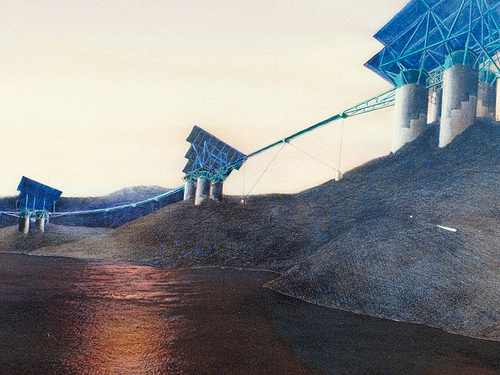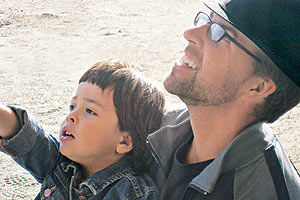In 1978, the architect Craig Hodgetts produced a set of drawings for a Hollywood movie adaptation of Ernest Callenbach's Ecotopia — this one depicts one of Ecotopia's high-speed mag-lev train. "The drawings were exhibited and published," notes The Architects' Newspaper, but "the project never made it to the silver screen." We invite readers to contrast these drawings, which imagine a utopian Bay Area at the dawn of the twenty-first century, with photographs of the gritty, dystopian reality that surrounds Novella Carpenter's "Ghost Farm" near downtown Oakland today.
In part one of our conversation with Ecotopia author Ernest Callenbach and Farm City author Novella Carpenter, we explored the roots of the Ecotopian vision. Now in part two, we look at its impact on younger generations.
JAS: Novella, did you read Ecotopia when you were younger? Did it influence you?
NC: I read the book when I lived in Seattle and I was a book editor there. I can’t say that I was influenced by it. I wouldn’t say that because I read it after I was already doing things like this. And it’s not so much of a handbook about how to do stuff; it’s not practical at all.
But you know there were certain things in there that made me think I should go to San Francisco, maybe. Of course, San Francisco has this whole zeitgeist to being the place where new things are happening and, you know, it’s where all the new Pioneers of Whatever Movement are going to be. Reading Ecotopia might have helped motivate me to move to the Bay Area. But I wouldn’t say that it helped pushed me to become an urban farmer.
How much urban farming is there in Ecotopia? Remind me.
EC: The food system is much more local and a lot more resilient.
JAS: There’s actually quite a lot, but Ernest doesn’t frame it as “urban agriculture,” the way we use the term today—it’s implicit in the book that city dwellers participate in farming and cultivation, but according to my memory, he doesn’t explicitly describe community gardens or vertical farms, stuff like that. To the extent Ecotopia has influenced urban agriculture, I suspect it’s more a matter of attitude and philosophy than any explicit practice.
EC: There are people who come to me and say, “Your book changed my life” and I always cautiously say, “Well, I hope for the better.” Usually that’s the case, but I think mostly the effect that it had on people—or maybe still has—is that it gives them sort of a blast of hope. You know, most of the scene around us, especially when you’re 18 or 20 in America today, is so discouragingly bleak. If you read a book like Ecotopia which says, “We may have messed up big-time but it’s conceivable that we can put it back together here,” then that’s a very novel—I mean it seems hum-drum now, but it was a very novel message at the time.
NC: And it still is. If you think about it, it’s always dystopias now. It’s like everything messed up. And so to read that is very hopeful.
JAS: Novella, what role does this kind of hopeful writing play in your backbreaking daily life as an urban farmer?
NC: I guess there are moments in the book when there’s a sense of an attitude of respect and being nice to each other. You don’t treat the person at the ticket counter like a machine. That’s very West Coast, I think. That is kind of a reflection on the life that we want to lead. Now, I’ve grown up on the West Coast so that’s all I know, so I can’t say—I just feel like it reflected something about myself that I know is true but I hadn’t had really reflected back to me. The main character [in Ecotopia] is this outsider, right? He’s reporting from the outside. And so in some ways it’s sort of like, “Oh, if someone came here to do a report about my life, they would write about similar things.” You know? Like wow, there’s a sense of time and busy-ness, but respecting each other. And so I think that’s kind of what I pick up on it.
JAS: Do you see Ecotopia as a vision that you’re working towards on your farm?
NC: No. The thing is, I’m not part of that. Because that was like my parents’ deal. They were utopians. They were gonna go and live back to the land and all this stuff and I think that’s kind of bullshit. My tendency is to react against that, is to not ever think there’s going to be Utopia. It’s sort of a pessimistic optimism, is what I call it. So, you’re like, “I want to do this thing but everything’s fucked up.” I mean, it’s like that’s what is awesome about Ecotopia, is that everything isn’t fucked up.
 The view of the neighborhood from Novella Carpenter's "Ghost Farm." Credit: Jeremy Adam Smith
The view of the neighborhood from Novella Carpenter's "Ghost Farm." Credit: Jeremy Adam Smith
But in my world, the apocalypse has arrived. I mean, look around you [she gestures out the window]. There’s abandoned buildings, there’s broken glass, it’s fucked up. But then at the same time you’re like, “What can I do with this?” It’s not like my scene is going to gentrify anything, because who wants to live next to goats? Not necessarily rich white people. I don’t think I’m driving property values up, for instance.
I just react against that kind of utopian thinking because I don’t think it’s sustainable, and I’ve noticed that what happens is people get old and tired and they don’t want to live like that. They want to have cars and comforts and that’s just the reality.
So I’m just doing what I can right now while I’m feeling good, but I have no sort of delusions that this can continue, because I’m squatting on this land and I’m just getting what I can out of it while I can. It’s a survival mode. And that’s totally different from the utopian mode, which is written from a place of great comfort and privilege, to just be like, “Oh, cool, I am going to go live back to the land,” and all this stuff and you have these ideals. Mine is just like, do what you can with what you have right now. End of story. Don’t even think of the future because there is no future.
JAS (to EC): How do you react to that?
EC: Um, well…I can understand absolutely where you’re coming from.
The one thing we haven’t brought into the conversation yet is the voluntary simplicity movement, which started about the same time as I was writing Ecotopia. Now there’s this magazine called Simplicity, which I think is put out by Time, Inc, which is all about advertising things you can buy to live more simply, but there are a lot of people out there—and not only in the supposedly wise coastal areas, but all over the country—who are doing it voluntarily, sometimes for religious or quasi-religious motives, but also just partly from economic motives. I mean, if you’re really short on dough you’re going to have to make some simplifications in your life and your children’s lives and so on.
I sometimes refer to the impact of a book like Ecotopia as running a flag up the flagpole to see if anyone will salute. It gave people a symbol of alternativeness, and whether we think this alternative would ever happen in anything like the way I portray, or not, is in a certain way not the whole question — the question is whether it makes sense to think beyond where we are.
Now, I greatly admire people like Novella who are buckling down. They’re the invader weeds of the disturbed areas of our society, and goddess bless them — may they thrive and improve the soil for whoever comes afterwards.

But I think it also makes sense to try and step back. I’ve talked, for example, to fifth graders in central Richmond. A guy up there had read Ecotopia and invited me to come talk to his English class, I guess it was. He had been reading them Ecotopia — expurgating the sex and marijuana — and they had been drawing these drawings of scenes from the book. I spent about an hour and a half with them — we managed to keep their attention for a long, long time. He asked them what they liked about the book and there was one tough little kid named Charlie who said, “I like it that they get to fight,” but there was an extremely neatly done-up girl who said, “What I like about Ecotopia is that there isn’t any gunfire in the streets,” like there apparently is on her streets.
And so in a way I think the book may have given even these little kids a sense that difference is possible. When you live in a society, everything seems like it’s locked down and nothing can possibly change — and in many ways there are reasons to believe that that’s true. But I wrote the book to give myself hope, believe it or not. In 1971 it looked like the world was being destroyed ecologically at a very rapid rate. It seems like the golden age to us now, when we look back, but if we had seen it at the time…. I wanted to create a world that would make myself feel better. And it did! As you get into writing a thing like that you can do all these very dramatic things — like I got rid of Redwood City in a single sentence! Because I have a fairly technological mind, I was very interested in all the little minute details of how we could do things differently.
NC: My parents decided to go back to the land and try to create a utopia, and you sat down and wrote a book about it.
EC: Yeah, although Ecotopia is not really a back-to-the-land book — people think it is, but it’s really a city book. How can we make cities and their peripheries sustainable? Having grown up in the country I have a very clear remembrance of how fuel-intensive country living is. Every time you want something, you have to drive to get it. I know people up in Mendocino; they need a loaf of bread or something and they drive 20 miles into town over terrible roads and they’re probably getting six miles to the gallon. It’s just appalling.
NC: Yeah, and that’s why I didn’t want to do the back-to-the-land thing…and also, you know, the isolation of country living is just horrible.
JAS: Novella, do you see your farm having impact on the surrounding community here in Oakland?
NC: I think there’s an impact. I think it’s the same thing as what Ernest was describing, running a flag up on the pole — it’s a positive thing that people can see, and say, “Hey, it could be like this.” You know, there’s an empty lot on every street corner. Every block has an empty lot. And it’s not—by no means do I feed everybody here, but people do come by and harvest food. And I feel like it just gives people a different option. It gives people a sense of hope or maybe this idea of the impossible being possible. Because I think people often think, “Oh, everything’s just so dirty in the city.” There’s this whole loathing of cities that goes on, especially in America, because we’re a rural people, ultimately, in our heritage, and so we have built this ideal of what it means to live out in the country: the fresh air, the trees—you know, no bad things are there. I wanted to prove that you could do something in a city that was considered to be a rural activity like raising goats or ducks or growing food.
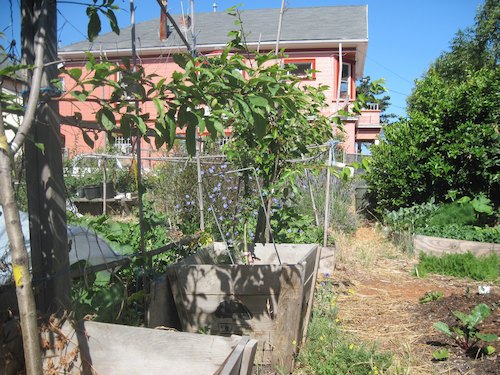
JAS: Why is that important to you?
NC: It’s important to me because it’s important to be self-sufficient and to be able to understand your life processes. Understanding where everything comes from. Understanding what is nourishing you. I just like to know where that stuff comes from. And I’m not well off, so I need to grow that stuff myself instead of having a farmer do it by proxy and paying them well to do it. Which is what most people in Berkeley and the Bay Area tend to do. So it was a move toward better understanding and then better eating. And you know, I’m not the sort of person that can just work in an office. I need to have contact with the earth and be around plants and animals, I just have that need. I think a lot of people do, they just don’t know. And maybe that’s why they have pets, that’s why they have cats and dogs, because they wanna have some kind of connection to—
EC: That’s as near as they can get.
NC: Yeah, that’s as near as they can get.
EC: Do you have any contact with the school gardens people?
NC: Like Edible Schoolyard and that kind of stuff? Not really.
EC: I was wondering whether teachers might want to bring kids in to look at the garden.
NC: They do, but there are liability issues. And then there’s me, my issue. Like, do I really want kids…? I mean, I’ve had kids…. but I will never have people from well-to-do schools — they always wanna come here and I’m like no. You guys can go wherever the fuck you want.
EC (interjecting): "Start your own damn garden!"
NC: A friend of mine who works for the Piedmont school district brought his class and they all got off the bus, and my friend Keela, who lives in that squatted building there, he said, “What is this? Some kind of ghetto tour?” You know, because it’s all white kids. That’s just fucked up.
So I’m not interested in—those kids have enough privilege; I’m not going to give them further privilege by making them feel like they can just come here too. I’m pretty protective of this neighborhood and I do have farm tours and that kind of thing, but I always do it in a context of trying to support the community. I’ve had kids from East Oakland come out and kids from around here come out. I’ve had local people make food to sell at the events, so there’s sort of a sense of, you know, having some kind of economic gain for people coming through the neighborhood.

EC: Do people from the neighborhood just come and hang out? I noticed there was a young guy sitting out there in the sun taking a sun bath when I came in.
NC: Oh yeah! Really? Was he? Who was it? Did he have dreadlocks?
EC: I didn’t notice his hair, a young black guy maybe 15, 16, something like that. He had on a sweatshirt of some kind, I think.
NC: Yeah, I like that, people come out just to get out of the concrete jungle….
EC: I think that there’s an immense magic power in people seeing things grow.
NC: Yeah.
EC: I mean, that’s what the Edible Schoolyard people at the Center for EcoLiteracy up in Berkeley find. You get ordinary American kids away from their mechanical contrivances and put them in contact with photosynthesis, and it’s a really, really big deal. Because there’s a magic to it. There’s no getting around it. It’s actually big, heavy magic. And it oughta be obligatory that all kids have a garden or a pot on the windowsill or something, so they can see it happen.
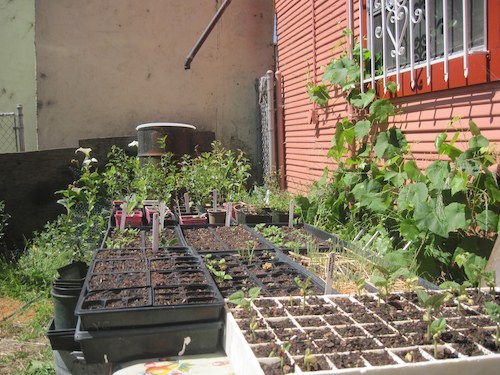
NC: Yeah, and caring for things. I think that gets back to your question why do I do it. Because if I didn’t have something to care for, I don’t know what I would do. It’s so nice to just be feeding things and nourishing and watching them grow. And it’s a very human thing, but now it’s like, what we do is we nourish our blogs. Facebook is kind of doing that. You know, I have a blog too, it’s part of how we communicate, but in some ways it’s very similar. You’re feeding the beast. You’re feeding the blog, you’re feeding the Facebook. It’s the same thing it’s just a different form of it. I’m not saying it’s good or bad, it’s just a human compulsion.
JAS: I always say that editing online is like gardening—you’re creating an environment in which things can grow on their own. But editing for print is more like manufacturing…
EC: And you have a finished product, which is immensely satisfying at least to you, though maybe not so satisfying to the reader.
NC: It’s the harvest, though. I think making books is the same way. There’s the tending, tending, tending, and then you’re preserving it—you’re putting it in a jar. Which I love to do, too.
JAS: Ernest, the biggest change we’ve seen since you first published Ecotopia is the emergence and growth of the Internet. How do you view that, through the Ecotopian lens?
EC: Well, you know, the funny thing is, being from an agricultural community background and also of my generation, I sometimes look at technological things and think, “Actually, this is no big fucking deal.” I would not venture to say that about the Internet, but I actually think that the cell phone is probably the most transformative technology, more than computers and the Internet because it affects how people do – or, more importantly, do not – relate to each other physically, as organisms.
The human species presumably evolved over a very, very long period to live in tribal-sized groups and forage and survive. We’re way, way, way, way past that, we’d like to think — but in a certain way, we’re not. I think it’s astounding that you can go into your computer and Google more or less anything.
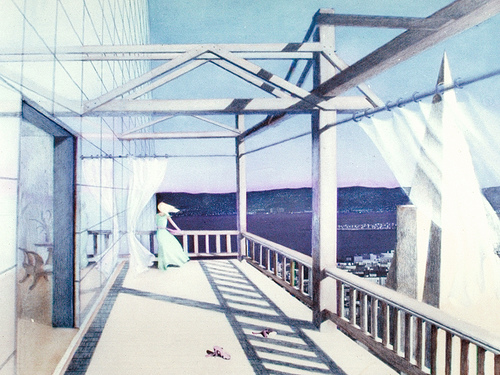
For example, I’m looking for a faucet handle that turns down, like these things that you use in the kitchen, so if your hands are dirty or covered with chicken guts or something you don’t want to touch the faucet, you wanna use the back of your hand. So I had ones that turn up, but then they interfere with the faucet spout dripping down so it turns the faucet off. So I’m looking for a handle like that, that turns down. This morning I got on the Internet and I googled “faucets” and then “Chicago faucets,” which is what I have in my kitchen, and did not find one but now I am assured that they don’t exist. Whereas previously I would have had to burn up gas going to a plumbing supply place or something like that.
This is all wonderful and it does indeed create a kind of a giant interconnected brain where people who know things—I’m very impressed, for example, by Wikipedia. When Wikipedia started out I said “What?! You’re gonna let people just put stuff up there? It’s all gonna be garbage!” In fact, a bunch of librarians studied it, comparing to the Britannica, and its error rate is about the same as the Britannica’s.
There’s prankery, I’m sure, and Wikipedia is apparently having to crack down and have more people watch stuff that’s being posted or changed. But it’s kind of a miracle that so many people have been able to concoct this thing.
I am not so happy about the idea of the gigantic bandwidths and the gigantic energy consumption that goes on in server farms. People think it’s a low-energy industry. Not so. It’s not a low-energy industry. The Ecotopians had picture phones and fast trains designed to move bodies from point A to point B as efficiently as possible — if it couldn’t be done efficiently, the Ecotopians would not do it at all. In moving these vast video files and things like that around, maybe we’re really going to have to cut back on it in some way.

NC: But wait, go back to what you meant by “no big fucking deal.” What would farmers think is “no big fucking deal” about technology?
EC: Well, there are certain ways in which the Internet functions as a kind of bulletin board. The second-hand book trade now is enormously augmented compared to what it used to be, for instance. If I was a farmer and seeking a market for my turnips, it would be very handy to be able to get more market transparency by using the Internet, and I believe that’s happening to some extent, although there’s still these huge combines—Archer-Daniels-Midland and so on, at least for commodity crops. But where people can get a lot of up-to-date information that’s reasonably reliable, it can hardly do them harm.
At least leaving aside the question of mental harm. Because you can have too much information. I have a friend who uses an acronym in conversation with his very articulate daughter. They say to each other “TMI,” which means you’re giving me too much information, I can’t digest it, I can’t use it, it’s blah blah blah blah blah blah blah. It’s like that with the Internet.
NC: But they mean “too much information” like “overload,” whereas usually TMI means like, “Uh, I didn’t wanna know that detail about your sex life, Dad.”
JAS: Both meanings can apply to the Internet! Too much data, and too much information about people’s sex lives.
EC: It’s very hard to know whether we are suffocating in a mass of information that un-equips people for dealing with actual issues. Ted Roszak, my friend that I was mentioning before, wrote a book called The Cult of Information in which he distinguishes between things that are useful hypotheses or proposals or things that might be used to structure some kind of activity or whatever, and data which is just data — it just lies there. Data is inert, basically. And the human mind can get overwhelmed by data. I spend maybe an hour a day on the computer and I feel overwhelmed by data and I know there are people who spend four or five, six hours a day…

NC: And then there are limits to data. For instance, I’m building that cob oven so I watched a bunch of YouTube videos, right? How to do it. But what you realize is there is no definitive answer. That’s what the Internet teaches us, is that there’s a million different ways you could do this and until you’re doing it—until you do the experiment in your conditions when using your particular soil, then you won’t know. So in some ways it’s great because it makes people recognize that fact that there is no expert, there is no one right way to do something until you do it for yourself.
JAS: You could say that about building a real Ecotopia.
NC: It’s true!
EC: Mixing mud is such a physical thing that if you don’t have somebody that you can apprentice yourself to who says, “It’s too soupy, it’s too tough, it’s too whatever,” you’re not going to be able to really do it within a range of rightness. So we still need a lot of apprenticeships. We can’t rely on abstract information coming in over the web or even through books. We need to get our hands dirty and plant our own seeds, and see what happens.
